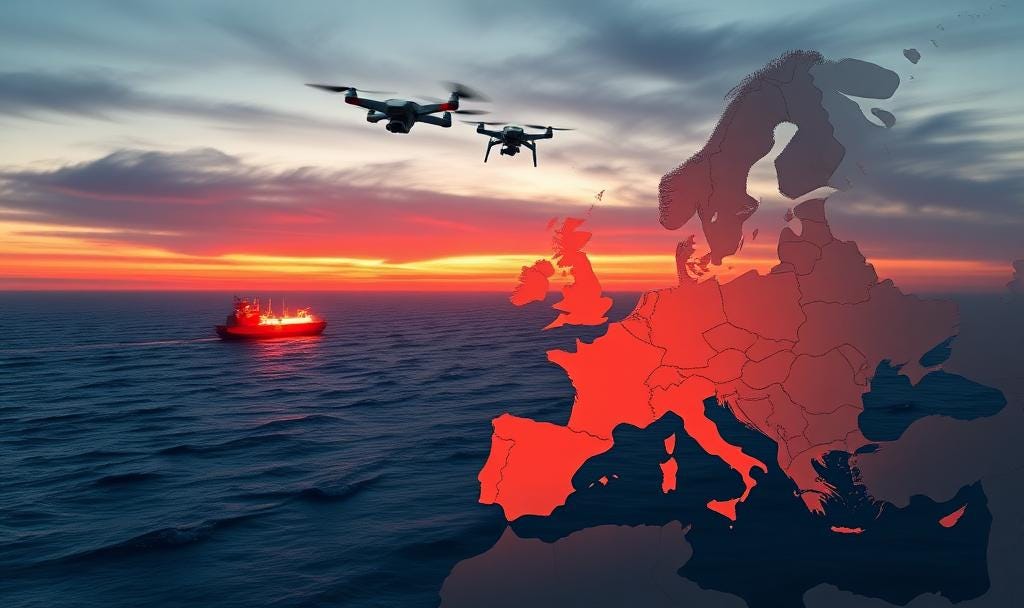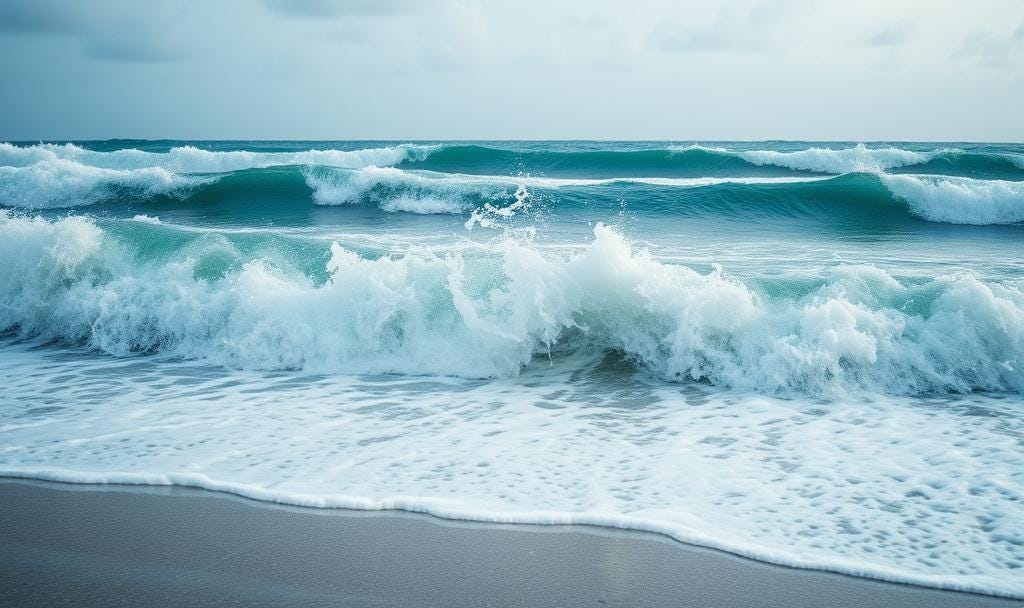10 Things Global News - 15th September 2025
The news from around the world
Russian Drone Breaches Romanian Airspace
Ukraine Hits Kirishi Oil Refinery In Russia
Trump Pressures NATO Over Russian Oil Imports
Qatar Summit Rallies Arab and Islamic Support
Rubio Visits Israel Amid Gaza and Qatar Fallout
Gen Z Protests Propel Nepal’s Interim Leader
Utah Suspect Held In Charlie Kirk Killing
Australia Warned On Rising Coastal Climate Risks
Europe’s Summer Extremes Cost €43BN So Far
Marcos Backs Protests Over Corruption Scandal
Now you can listen to 10 Things Global News
Romania has reported that a Russian drone entered its airspace on Saturday evening, marking the second such incursion into NATO territory in less than a week. The country’s defence ministry said two F-16 jets detected the drone while monitoring Russian strikes on Ukrainian infrastructure near the border. The aircraft tracked the drone for around 50 minutes before it left Romanian airspace without causing damage. Officials said pilots received authorisation to shoot it down but decided against firing due to the risk of collateral damage.
The breach prompted strong condemnation from European leaders. EU foreign policy chief Kaja Kallas called it an “unacceptable breach” of sovereignty and warned of “reckless escalation”. Romania’s foreign minister Oana-Silvia Toiu also branded the intrusion “unacceptable and reckless”. President Volodymyr Zelensky argued the incident could not have been a mistake, calling it “an obvious expansion of the war by Russia”. NATO has not yet commented, while Moscow has denied targeting alliance members.
Sources: New York Times, BBC
Ukrainian drones struck the Kirishi oil refinery in Russia’s Leningrad region overnight, causing explosions and a fire, according to Ukraine’s military and Russian officials. The facility, operated by Surgutneftegas, is one of Russia’s largest refineries, producing close to 18 million tonnes of crude per year. Leningrad governor Alexander Drozdenko said three drones were downed above the area and that a blaze sparked by falling debris was extinguished, with no civilian injuries reported. Russian officials did not detail the extent of damage.
The strike is part of an intensifying aerial campaign as both sides target energy and transport infrastructure. Russia’s defence ministry said its air defences shot down hundreds of drones overnight, while Ukraine said it continues to hit infrastructure that supplies troops, fuel and ammunition to the front. Separately, Moscow said it test-fired a Zircon hypersonic cruise missile during joint drills with Belarus.
Sources: Al Jazeera, Euronews
US President Donald Trump has urged NATO allies to halt purchases of Russian oil, warning that continuing supplies weaken their leverage in negotiations with Moscow. He said he is ready to impose “major sanctions” on Russia once all member states stop buying its oil. Trump also argued that combining this move with tariffs of 50 to 100 per cent on China would help force an end to the war in Ukraine, a conflict he has repeatedly promised to resolve quickly.
European leaders have been lobbying Trump to recognise that President Vladimir Putin is not seeking peace, while Ukraine’s Volodymyr Zelenskyy welcomed tougher sanctions, saying reduced oil consumption would limit Russia’s ability to wage war. The debate comes as Russian drones breached NATO airspace, including Poland earlier in the week and Romania over the weekend. The incidents have added pressure on the alliance to strengthen its eastern defences.
Sources: Times of India, Politico Europe
Qatar has accused Israel of a “barbaric” attack on its soil and convened an emergency Arab-Islamic summit in Doha. Prime Minister Sheikh Mohammed bin Abdulrahman Al Thani said the incursion violated Qatar’s sovereignty and vowed to pursue legal measures. He praised Arab and Islamic states for condemning the strike, which killed five Hamas members and a Qatari security officer, and described the assault as an effort to derail ceasefire talks on Gaza.
Foreign ministers from the Arab League and the Organisation of Islamic Cooperation prepared a draft resolution warning that Israel’s actions threaten regional coexistence and risk undermining efforts to normalise ties. Leaders are expected to deliver a strong collective response when they meet on Monday.
Qatar’s role as a mediator, alongside the United States and Egypt, will continue despite the attack. President Donald Trump reaffirmed U.S. support for Doha, while Israeli Prime Minister Benjamin Netanyahu maintained pressure over Hamas leaders based in Qatar.
Sources: Reuters, Al Jazeera
US Secretary of State Marco Rubio has met Israeli Prime Minister Benjamin Netanyahu in Jerusalem in an effort to limit diplomatic fallout from Israel’s strike in Qatar and its ongoing Gaza campaign. The Doha attack targeted Hamas officials but killed aides and a Qatari guard, angering Washington’s Arab partners. President Donald Trump expressed dissatisfaction, while Rubio signalled US support for Israel would continue despite the incident.
Rubio’s visit coincided with intensified Israeli strikes on Gaza, where high-rise buildings have been levelled and at least 13 Palestinians killed on Sunday, according to local hospitals. The strikes have fuelled accusations of genocide against Israel and ended prospects for a ceasefire or hostage release before the UN General Assembly. As Israel orders residents to evacuate Gaza City, its war has displaced most of the enclave’s two million people, with more than 64,000 killed since the conflict began.
Sources: The Guardian, NPR
Young activists in Nepal used Discord and Instagram to mobilise mass protests after a government ban on major social media platforms, forcing Prime Minister K.P. Sharma Oli to resign. The demonstrations, focused on corruption and governance, turned deadly, with at least 72 people killed. Former chief justice Sushila Karki has been appointed interim prime minister and vowed to follow protesters’ demands and pursue a corruption-free agenda.
Members of Hami Nepal, the youth-led group behind the mobilisation, say they helped persuade the president and army chief to back Karki’s appointment and are now discussing cabinet posts while declining ministerial roles themselves.
Elections are set for 5 March, with Karki pledging to hand over power within six months. Authorities reversed the social media ban amid the crisis, and meetings between Karki and movement representatives continue as they work to restore order and define next steps.
Sources: Reuters, South China Morning Post
Authorities are investigating the killing of Charlie Kirk during an event at Utah Valley University, with suspect Tyler Robinson, 22, arrested after a 33-hour manhunt. He is being held without bail on counts including aggravated murder, felony discharge of a firearm and obstruction of justice, and is under enhanced supervision pending a mental health evaluation before a court appearance on Tuesday. Officials say investigators are reviewing online messages, notes and a rifle found near the scene.
Utah Governor Spencer Cox said Robinson is not co-operating and has not confessed. Investigators are examining engraved bullet casings and online communications as they assess potential motives; Robinson’s roommate, whom the governor described as transitioning, is co-operating. A memorial for Kirk is planned on 21 September at State Farm Stadium in Arizona, while his widow has pledged to continue his tours and podcast.
Sources: BBC, CNN
Australia’s first National Climate Risk Assessment warns that more than 1.5 million people living in coastal areas could be at risk from sea-level rise by 2050. The assessment models impacts under 1.5C, 2C and 3C of warming, finding sea levels could rise by 0.14m at 1.5C and 0.54m at 3C, with Queensland home to 18 of the 20 most-exposed regions. The government says the report is an honest warning, released days before it sets a 2035 emissions target.
The report flags sharp increases in heat-related deaths, with Sydney rising by more than 400% under a 3C scenario and Melbourne facing large increases. It also points to nationwide economic exposure, including an estimated A$611bn hit to property values by 2050 and disaster recovery costs exceeding A$40bn annually. Alongside the assessment, a national adaptation plan has been released to coordinate responses across federal, state and local levels.
Sources: BBC, ABC News
Extreme heat, drought and flooding across Europe this summer caused at least €43bn in short-term losses, with total impacts from this season projected to reach €126bn by 2029. The rapid analysis, based on links between weather and output and not yet peer-reviewed, estimates the immediate hit at 0.26% of EU economic output in 2024. The greatest damage was in Cyprus, Greece, Malta and Bulgaria, each losing more than 1% of their 2024 gross value added, followed by Spain, Italy and Portugal.
Researchers say estimates are conservative because they exclude record wildfires and compounding events. The study also captures indirect effects, such as lost working hours during heatwaves or transport disruption after floods. Separate figures indicate Spain, France and Italy each face close to €34–35bn in losses, while Germany’s hit is about €2.5bn. Around a third of the total impact falls this year.
Sources: The Guardian, Market Scanner, Efeverde (Spanish language)
Philippine President Ferdinand Marcos has said he does not blame citizens for taking to the streets over a widening corruption scandal linked to fraudulent flood control projects. He described the public’s anger as justified and announced the creation of a three-member commission led by former Supreme Court justice Andres Reyes to investigate projects dating back a decade. The inquiry follows claims by construction executives that nearly 30 lawmakers and public works officials accepted illicit payments.
The scandal has sparked a series of protests in Manila, including one involving 3,000 students, with larger demonstrations expected in coming days. Marcos acknowledged that allies, including House Speaker Martin Romualdez, would not be shielded, though Romualdez denies involvement. The Department of Finance estimates losses of up to 118.5 billion pesos ($2bn) from 2023 to 2025. Marcos urged the public to remain peaceful, warning against unrest seen elsewhere in Asia.
















